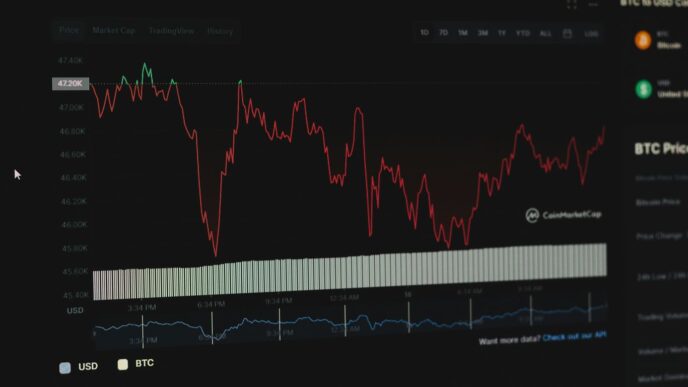Thinking about a career in technology? The world of ab information technology offers a lot of possibilities, from getting your degree to landing a job and growing from there. It’s all about using computers and systems to help businesses work better and solve problems. Let’s break down what an ab information technology path looks like.
Key Takeaways
- An ab information technology degree covers core tech skills and specialized areas, preparing you for various IT roles.
- IT careers span many industries, with opportunities for growth from entry-level jobs to management.
- The curriculum for ab information technology includes foundational courses, specialized tracks, and hands-on projects.
- Ab information technology plays a big part in helping businesses solve issues, run more smoothly, and adopt new digital tools.
- Beyond a bachelor’s, you can pursue advanced degrees, an MBA, or focus on continuous learning to advance your IT career.
Understanding Ab Information Technology Degrees
What is Information Technology?
Information Technology, or IT, is all about using computers and related systems to manage and process information. Think of it as the backbone that keeps businesses and organizations running smoothly in our digital world. It’s not just about fixing computers when they break, though that’s part of it. IT professionals are the ones who design, build, and maintain the systems that allow us to communicate, store data, and get work done efficiently. A degree in Information Technology prepares you to tackle organizational challenges by applying technology effectively. It’s a field that constantly changes, so you’re always learning new things.
Core Skills and Knowledge Areas
When you study IT, you’ll pick up a wide range of skills. You’ll learn about how computers talk to each other (networking), how to build and manage databases where information is stored, and how to write code (programming) to create software and applications. You’ll also get into project management, figuring out how to get IT projects done on time and within budget. Security is a big one too – protecting systems and data from threats is super important. Here’s a quick rundown of what you’ll likely cover:
- Systems Development: Learning how to design, build, and maintain software and hardware systems.
- Networking: Understanding how to connect computers and devices so they can share information.
- Database Management: Skills in organizing, storing, and retrieving large amounts of data.
- Information Security: Protecting digital assets from unauthorized access and cyber threats.
- Project Management: Planning, executing, and closing IT projects successfully.
Specializations and Options
Most IT degree programs let you specialize in areas that really interest you. This is where you can really tailor your education to a specific career path. Some common specializations include:
- Application Development: If you like building apps or software, this track focuses on programming languages and software design.
- Cybersecurity: For those interested in protecting systems and data, this involves learning about threats, defense strategies, and digital forensics.
- Business Applications: This option bridges the gap between IT and business needs, focusing on how technology can solve organizational problems and improve operations.
- Networking and Infrastructure: This path is for people who want to manage and maintain the computer networks that organizations rely on.
Choosing a specialization helps you gain deeper knowledge in a specific area, making you more attractive to employers looking for particular skill sets.
Career Pathways in Ab Information Technology
So, you’ve got your IT degree, now what? It’s a common question, and the good news is that an Information Technology degree opens up a whole lot of doors. It’s not just about sitting in a dark room fixing computers, though that’s part of it for some! This degree gives you a solid technical base along with the people skills needed to actually make technology work for businesses.
Entry-Level IT Positions
When you first start out, there are tons of roles you can step into. Think of positions like:
- Help Desk Technician: This is often the first stop for many. You’re the go-to person for immediate tech problems users are having.
- Junior Network Administrator: You’ll help manage and maintain the computer networks that keep an organization connected.
- IT Support Specialist: Similar to help desk, but might involve more hands-on troubleshooting with hardware and software.
- Web Developer (Junior): If you focused on web technologies, you could be building and maintaining websites.
- Database Assistant: Helping to manage and organize the data that businesses rely on.
The combination of technical know-how and communication skills makes graduates ready for these roles. It’s about applying what you learned in school to real-world problems.
Industries Employing IT Graduates
Honestly, almost every industry needs IT folks these days. You’re not limited to just tech companies. Consider these sectors:
- Healthcare: Hospitals and clinics need IT to manage patient records, equipment, and communication systems.
- Finance: Banks and investment firms rely heavily on secure and efficient IT infrastructure.
- Government: Public sector organizations use IT for everything from citizen services to defense.
- Education: Schools and universities need IT for online learning, administration, and research.
- Retail: From online stores to managing inventory, IT is key.
- Manufacturing: Keeping production lines running smoothly often involves complex IT systems.
Basically, if an organization uses computers, they need IT professionals. You might even find yourself working as an information systems consultant, advising businesses on how to best use technology.
Long-Term Career Growth
Your first IT job is just the beginning. With experience and maybe some further training, you can move up. Many IT professionals progress into roles like:
- System Administrator: Managing entire IT systems for an organization.
- Network Architect: Designing and building complex network infrastructures.
- Cybersecurity Analyst: Protecting systems and data from threats.
- IT Project Manager: Leading teams to implement new technology solutions.
- Software Developer: Creating new applications and software.
- IT Manager/Director: Overseeing the entire IT department and strategy.
The field is always changing, so continuous learning is a big part of staying relevant and advancing your career. It’s a dynamic path with plenty of room to grow.
Ab Information Technology Curriculum and Coursework

Foundational IT Courses
So, you’re looking into an Information Technology degree? That’s cool. The first thing you’ll probably notice is that the curriculum is designed to give you a solid base. Think of it like building a house – you need a strong foundation before you start putting up walls. You’ll likely run into courses that cover the basics of how computers talk to each other (networking), how to store and manage information (databases), and how to actually build things with code (programming). There’s also a big push to understand how to analyze problems and design solutions, which often comes up in systems analysis and design classes. You’ll also get a taste of security and risk analysis, because, let’s be honest, keeping things safe online is a pretty big deal these days.
Here’s a peek at some common starting points:
- Introduction to Systems Analysis and Design: Learning how to break down problems and plan IT solutions.
- Networking and Telecommunications: Understanding how networks function and connect devices.
- Database Management and Administration: How to organize, store, and retrieve data effectively.
- Programming for the Web: Getting hands-on with coding for online applications.
- Introduction to Security and Risk Analysis: Recognizing potential threats and how to protect systems.
Specialized Track Options
Once you’ve got that foundation, things get more interesting. Most IT programs let you pick a specific area to focus on. This is where you really start to tailor your degree to what you want to do after graduation. Some popular choices include:
- Application Development: If you like building software or mobile apps, this track is for you. You’ll dive deep into object-oriented programming and learn how to create complex applications.
- Cybersecurity: This is a huge field right now. You’ll learn about protecting systems from threats, ethical hacking, and digital forensics.
- Business Applications: This path focuses on how IT can solve problems within businesses. You’ll look at integrating systems and improving business operations.
- Networking: For those who enjoy the infrastructure side, this track covers advanced network design, implementation, and management.
It’s not just about picking a track, though. You’ll also select supporting courses that complement your chosen specialization, giving you a well-rounded skill set.
Project-Based Learning and Application
What’s great about many IT programs is that they don’t just keep you in textbooks. A lot of the learning happens through doing. You’ll likely work on projects, often in teams, that mimic real-world scenarios. This means you’re not just learning theory; you’re applying it. You might be tasked with designing a database for a fictional company, developing a web application, or creating a security plan. These projects often involve a good amount of writing and presenting your work, which are super important skills for any IT professional. The goal is to graduate with not just a degree, but also a portfolio of work that shows employers what you can actually do.
The Role of Ab Information Technology in Business
Solving Organizational Challenges
Information Technology (IT) degrees are all about using tech to fix problems businesses run into. Think about it – companies today are drowning in data and complex processes. An IT grad comes in with a toolkit to sort through all that. They learn how to look at a company’s setup, figure out what’s not working, and then use technology to make it better. It’s not just about fixing computers; it’s about understanding how systems work together and how to improve them. This could mean streamlining how a company handles customer orders, making sure their internal communication flows smoothly, or even setting up systems to prevent data loss.
Enhancing Efficiency and Reliability
When businesses run smoothly, they make more money and keep customers happy. IT plays a huge part in this. Graduates learn to build and manage systems that are dependable. This means less downtime, fewer errors, and processes that just work. For example, setting up a robust network means employees can access what they need without constant interruptions. Or, implementing a good database system makes sure information is accurate and easy to find. The goal is to make the business run like a well-oiled machine, cutting down on wasted time and resources.
Driving Digital Innovation
Beyond just keeping things running, IT professionals are the ones pushing businesses forward. They’re the ones looking at new technologies and figuring out how they can be used to create new products, services, or ways of doing business. This could involve developing a new mobile app for customers, implementing cloud solutions to make data more accessible, or using data analytics to understand customer behavior better. It’s about staying ahead of the curve and finding new ways for the company to grow and compete in today’s fast-paced digital world. Here are a few ways IT drives innovation:
- Developing new software applications to meet market demands.
- Implementing automation to speed up repetitive tasks.
- Analyzing data to uncover new business opportunities.
- Adopting cloud computing for better scalability and flexibility.
Opportunities Beyond a Bachelor’s Degree

So, you’ve got your Bachelor’s degree in Information Technology. That’s a huge accomplishment! But guess what? Your learning journey doesn’t have to stop there. Think of that degree as a solid launchpad, not a finish line. There are plenty of ways to keep growing and specializing in this fast-moving field.
Graduate Studies in Information Technology
Many folks decide to go back to school for a Master’s degree. This is a great way to really dig deep into a specific area of IT. You could focus on things like advanced cybersecurity, data science, or information systems management. A Master’s can open doors to more senior roles and research positions. It’s a big commitment, for sure, but if you’re passionate about a particular niche, it can be super rewarding.
Pursuing MBA and Law Programs
It might sound a bit surprising, but an IT background can also be a fantastic stepping stone to other fields. For instance, getting an MBA (Master of Business Administration) can equip you with strong business and leadership skills. This combination is gold for roles that bridge the gap between technology and business strategy, like IT management or consulting. On the other hand, some IT grads find themselves drawn to law, particularly in areas like intellectual property or cyber law. A law degree, combined with your tech knowledge, can make you a really unique and sought-after professional.
Continuous Professional Development
Beyond formal degrees, there’s a whole world of continuous learning. This is super important in IT because things change so quickly. Think about:
- Certifications: Industry certifications from companies like CompTIA, Cisco, Microsoft, or AWS can prove you have specific skills. They’re often quicker and less expensive than a full degree.
- Workshops and Bootcamps: These are great for picking up new skills or getting up to speed on the latest technologies. They’re usually intensive and hands-on.
- Online Courses: Platforms like Coursera, edX, or even YouTube offer endless learning opportunities on almost any IT topic you can imagine.
Staying current through ongoing education is key to a long and successful career in Information Technology. It shows you’re adaptable and committed to your field. Plus, it keeps things interesting!
Developing Essential Skills for Ab Information Technology
So, you’re looking into AB Information Technology, huh? That’s cool. It’s not just about knowing how to type fast or fix a printer, though those things can be handy. To really do well in this field, you need a mix of smarts and practical abilities. Think of it like building something – you need the right tools, but you also need to know how to use them and plan your project.
Technical Proficiency
This is the bedrock, right? You’ve got to be comfortable with the tech itself. This means getting your hands dirty with programming languages like Python or Java. It’s not just about writing code that works, but understanding how to build features, connect to online services, and manage data. You’ll also need to know your way around networks – how routers and switches talk to each other, and how to keep things secure with firewalls and antivirus software. Being able to manage servers and PCs is also a big part of the job. It’s a lot, but it’s all about making sure the digital gears of a company keep turning smoothly.
Problem-Solving and Analytical Skills
Technology is great, but it often comes with its own set of headaches. That’s where your brainpower comes in. You’ll be faced with all sorts of challenges, from figuring out why a system is crashing to finding the best way to implement new software. This requires looking at a problem from different angles, breaking it down into smaller pieces, and then figuring out the best solution. It’s like being a detective, but for computers and networks. You need to be able to look at the data, see patterns, and come up with a logical plan. This isn’t something you just learn from a book; it comes from practice and a willingness to really think things through.
Communication and Collaboration
This might surprise some people, but talking and working with others is a huge part of IT. You’re not usually working alone in a dark room. You’ll need to explain technical issues to people who don’t speak ‘tech’ at all – think managers or clients. This means being clear and concise, whether you’re writing an email or giving a presentation. You’ll also be working in teams, often with people who have different skills than you. Being able to share ideas, listen to others, and work together to reach a common goal is super important. Sometimes, the best solution comes from a group effort, not just one person’s brilliant idea.
Wrapping It Up
So, we’ve looked at what an Information Technology degree can mean for you. It’s not just about sitting in front of a computer all day; it’s about learning how to solve problems using technology, whether that’s building apps, keeping networks safe, or helping businesses run smoother. There are lots of different paths you can take with this kind of education, from getting a job right after school to going on to get a master’s degree or even something else entirely. The world of IT is always changing, but having a solid foundation in these skills can open a lot of doors for you.












